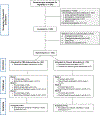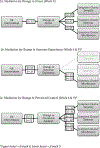Randomized controlled trial of a brief cognitive-behavioral strategies intervention for the pain, fatigue, and sleep disturbance symptom cluster in advanced cancer
- PMID: 30189462
- PMCID: PMC6279506
- DOI: 10.1002/pon.4883
Randomized controlled trial of a brief cognitive-behavioral strategies intervention for the pain, fatigue, and sleep disturbance symptom cluster in advanced cancer
Abstract
Objective: Patients receiving treatment for advanced cancer suffer significant symptom burden, including co-occurring pain, fatigue, and sleep disturbance. There is limited evidence for effective interventions targeting this common symptom cluster.
Methods: A randomized controlled trial of a brief cognitive-behavioral strategies (CBS) intervention was conducted. A sample of 164 patients with advanced cancer receiving chemotherapy practiced imagery, relaxation, and distraction exercises or listened to cancer education recordings (attention-control) to manage co-occurring pain, fatigue, and sleep disturbance over a 9-week period. Symptom cluster severity, distress, and interference with daily life were measured at baseline and 3, 6, and 9 weeks. We also evaluated the moderating influence of imaging ability and number of concurrent symptoms, and mediating effects of changes in stress, anxiety, outcome expectancy, and perceived control over symptoms.
Results: Compared with the cancer education condition, participants receiving the CBS intervention reported less symptom cluster distress at week 6 (M = 1.82 vs 2.15 on a 0-4 scale, P < .05). No other group differences were statistically significant. The number of concurrent symptoms moderated the intervention effect on symptom cluster interference. Changes in stress, outcome expectancy, and perceived control mediated the extent of intervention effects on symptom outcomes, primarily at weeks 6 and 9.
Conclusions: The brief CBS intervention had limited effects in this trial. However, findings regarding potential mediators affirm hypothesized mechanisms and provide insight into ways to strengthen future interventions to reduce the suffering associated with co-occurring pain, fatigue, and sleep disturbance.
Keywords: cancer; fatigue; imagery; oncology; pain; relaxation; sleep; symptom cluster.
© 2018 John Wiley & Sons, Ltd.
Conflict of interest statement
The authors have no conflicts of interest to declare.
Figures
Similar articles
-
Feasibility of a patient-controlled cognitive-behavioral intervention for pain, fatigue, and sleep disturbance in cancer.Oncol Nurs Forum. 2010 May;37(3):E151-9. doi: 10.1188/10.ONF.E151-E159. Oncol Nurs Forum. 2010. PMID: 20439200 Free PMC article.
-
Pilot randomized controlled trial of a patient-controlled cognitive-behavioral intervention for the pain, fatigue, and sleep disturbance symptom cluster in cancer.J Pain Symptom Manage. 2012 Dec;44(6):810-22. doi: 10.1016/j.jpainsymman.2011.12.281. Epub 2012 Jul 7. J Pain Symptom Manage. 2012. PMID: 22771125 Free PMC article. Clinical Trial.
-
The Role of Inflammation in the Pain, Fatigue, and Sleep Disturbance Symptom Cluster in Advanced Cancer.J Pain Symptom Manage. 2018 May;55(5):1286-1295. doi: 10.1016/j.jpainsymman.2018.01.008. Epub 2018 Jan 31. J Pain Symptom Manage. 2018. PMID: 29360570 Free PMC article. Clinical Trial.
-
Interventions for Managing a Symptom Cluster of Pain, Fatigue, and Sleep Disturbances During Cancer Survivorship: A Systematic Review.Oncol Nurs Forum. 2020 Jul 1;47(4):E107-E119. doi: 10.1188/20.ONF.E107-E119. Oncol Nurs Forum. 2020. PMID: 32555558
-
Mind-body treatments for the pain-fatigue-sleep disturbance symptom cluster in persons with cancer.J Pain Symptom Manage. 2010 Jan;39(1):126-38. doi: 10.1016/j.jpainsymman.2009.05.022. Epub 2009 Nov 8. J Pain Symptom Manage. 2010. PMID: 19900778 Free PMC article. Review.
Cited by
-
Predictors of Unrelieved Symptoms in All of Us Research Program Participants With Chronic Conditions.J Pain Symptom Manage. 2022 Dec;64(6):555-566. doi: 10.1016/j.jpainsymman.2022.08.018. Epub 2022 Sep 9. J Pain Symptom Manage. 2022. PMID: 36096320 Free PMC article.
-
Efficacy of aerobic and resistance exercises on cancer pain: A meta-analysis of randomised controlled trials.Heliyon. 2024 Apr 6;10(7):e29193. doi: 10.1016/j.heliyon.2024.e29193. eCollection 2024 Apr 15. Heliyon. 2024. PMID: 38623224 Free PMC article. Review.
-
Long-Term Favorable Effects of Physical Exercise on Burdensome Symptoms in the OptiTrain Breast Cancer Randomized Controlled Trial.Integr Cancer Ther. 2020 Jan-Dec;19:1534735420905003. doi: 10.1177/1534735420905003. Integr Cancer Ther. 2020. PMID: 32090630 Free PMC article. Clinical Trial.
-
Non-pharmacological interventions for sleep disturbance ("insomnia") in patients with advanced cancer: a scoping review.Support Care Cancer. 2025 May 21;33(6):486. doi: 10.1007/s00520-025-09550-2. Support Care Cancer. 2025. PMID: 40397175 Free PMC article.
-
Higher Stress in Oncology Patients is Associated With Cognitive and Evening Physical Fatigue Severity.J Pain Symptom Manage. 2023 Mar;65(3):203-215. doi: 10.1016/j.jpainsymman.2022.11.017. Epub 2022 Nov 22. J Pain Symptom Manage. 2023. PMID: 36423801 Free PMC article.
References
-
- Kirkova J, Walsh D, Rybicki L, Davis MP, Aktas A, Jin T, et al. Symptom severity and distress in advanced cancer. Pall Med, 2010. April; 24(3):330–339. - PubMed
-
- Beck SL, Dudley WN, Barsevick A. Pain, sleep disturbance, and fatigue in patients with cancer: Using a mediation model to test a symptom cluster. Oncol Nurs Forum 2005. May 10;32(3):E48–55. - PubMed
-
- Cheng KKF, Lee DTF. Effects of pain, fatigue, insomnia, and mood disturbance on functional status and quality of life of elderly patients with cancer. Crit Rev Oncol Hematol 2011. May;78(2):127–137. - PubMed
-
- Dodd MJ, Miaskowski C, Paul SM. Symptom clusters and their effect on the functional status of patients with cancer. Oncol Nurs Forum 2001. April;28(3):465–470. - PubMed
Publication types
MeSH terms
Grants and funding
LinkOut - more resources
Full Text Sources
Other Literature Sources
Medical



